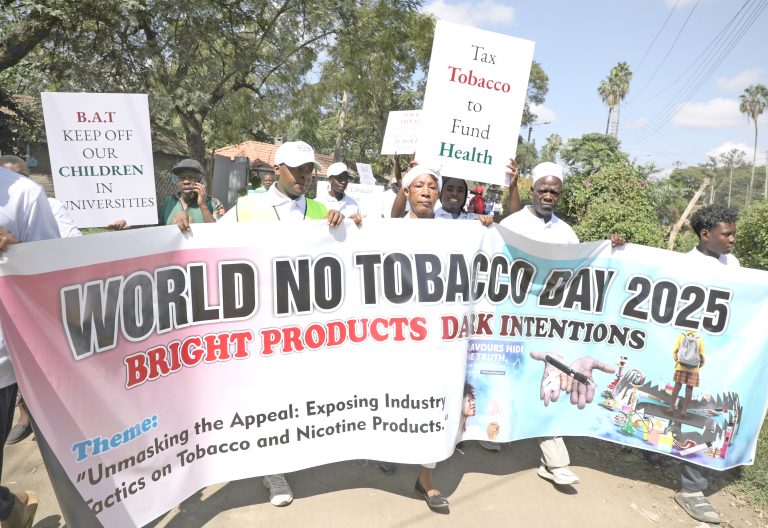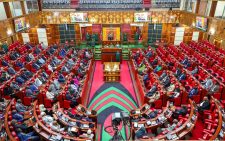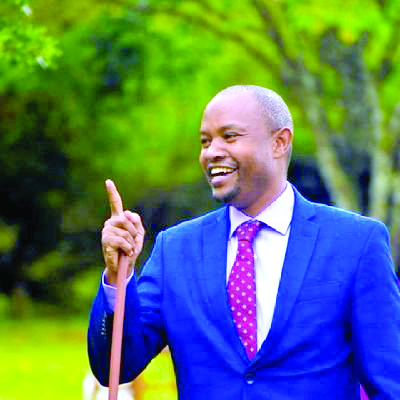CSOs scoff at State move in fight against tobacco

A network of Civil Society Organisations (CSOs) has dismissed the recent announcement by Health Cabinet Secretary Aden Duale regarding plans to suspend all licenses for nicotine-related products.
Speaking during the World No Tobacco Day celebrations in Eldoret on May 31, 2025, Duale gave importers, manufacturers, distributors, and marketers a 21-day window to reapply for their licenses, suggesting that this move would significantly reduce tobacco and nicotine usage in the country.
“The products were now becoming a serious menace in society, with data now indicating younger children were now engaging in the products,” Duale said when he set ablaze over 5 tonnes of tobacco and nicotine products seized through the Eldoret International Airport since 2021.
The CS also signed a Gazette Notice introducing 17 new graphic images to be displayed on tobacco and nicotine products to discourage users.
However, reacting to the latest policy pronouncements, the CSOs directly blamed the Ministry of Health, accusing its top leadership of aiding the entry of novel nicotine products into the country.
Speaking at the Kaloleni Social Hall in Makadara sub-county, Nairobi, under the Kenya Tobacco and Nicotine Tax Coalition (KTNTC), the CSOs called for the sacking of Public Health Principal Secretary, Mary Muthoni and Dr Andrew Toro, the Head of Drug and Substance Abuse Control at the ministry.
The CSOs wanted to hear the CS’s response to a leaked letter dated May 7, 2025, purportedly written by the PS soliciting support towards a campaign promoting healthy behaviour among long-distance transport operators and the boda boda riders.
Whereas the CS overlooked this issue, the PS has since disowned the letter and termed it a forgery.
According to Valerie Aura, a communications lead with Being Africa and tobacco control champion, the CSOs were helping the government in the fight against the tobacco menace in the country.
“The government has failed to support us. Firstly, by giving CSOs a share of the Tobacco Control Fund money to support advocacy activities across the country, and by compensating those affected,” she said while accusing ministry officials of engaging with the industry against the Tobacco Control Act.
The Act specifically prohibits government ministers and officials from accepting or collaborating with the tobacco industry in setting or implementing tobacco control policies.
It also bans tobacco companies from engaging in Corporate Social Responsibility (CSR) activities.
The CSOs are wondering about Duale’s silence, with some calling for the PS’s sacking in Eldoret.
In Nairobi, an effigy of the PS was burnt, with the CSOs also protesting through a march.
Kenya Tobacco Control and Health Promotion Alliance (KTCHPA) Chairman, Joel Gitali, wondered why the process of reviewing the Act had stalled for years.
Novel threats
“We had the Tobacco Control Act Amendment Bill, which was designed to eliminate the use of tobacco and nicotine. However, we don’t know where it is,” he said.
He pressed the ministry to be vigilant and weed out those officers within its ranks who were working in secret with the industry.
Recent national surveys underscore the growing threat of nicotine addiction among youth.
According to the 2022 Tobacco and Drug Abuse Survey (TADSAS), tobacco use among adults aged 15 to 65 has declined to 8.5 per cent, down from 11.6 per cent in 2014.
Data on Youth and Tobacco Africa 2024 report shows that over 650,000 adolescents aged 10–17 years have tried tobacco or nicotine products, whereas, according to the National Authority for the Campaign Against Alcohol and Drug Abuse (Nacada) 2024, the use of flavoured nicotine pouches and e-cigarettes is rising among university students.
In the same report, 8.6 per cent of university students had smoked e-cigarettes, while 4.6 per cent had used nicotine pouches.
According to Data on Youth and Tobacco Africa 2024, nearly 40 per cent of adolescents are exposed to tobacco promotion via digital and broadcast media.
World No Tobacco Day is observed around the world every year on May 31 and serves as a platform to inform the public about the dangers of using tobacco and the business practices of tobacco companies.
In 2022, tobacco-related illness-attributable healthcare costs in Kenya were $396 million (Ksh51 billion) according to the Tobacco Control Data Initiative.
The increasing targeting of youth will only increase the burden of these diseases in the future.












